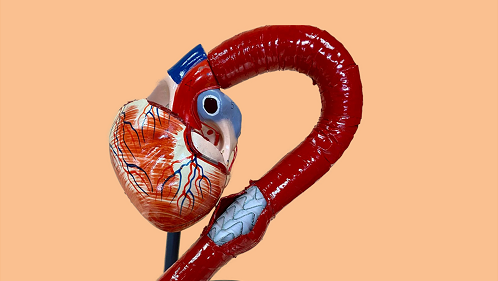Sree Chitra Tirunal Institute for Medical Sciences and Technology has developed a very cost effective heart stent, which would cost half the price of imported stents. Unlike stents manufactured by US and European companies, stents developed by Sree Chitra are designed for the anatomy of aorta of Indian patients, crimpable to a lower diameter and can be inserted into a lower diameter catheter sheath.
Thiruvananthapuram (ISJ): Thoracic aortic aneurysms (TAAs) or ballooning of weakened aorta wall is a fatal cardio-vascular condition, which can cause life threatening bleeding and potentially death. In India, there is an estimated 5-10 per 100,000 persons with TAA every year.
An aneurysm can be treated with open surgery or minimally invasive techniques. Endovascular Aortic Repair or EVAR is a minimally invasive technique which involves the insertion of stent grafts in the diseased vessel, by a delivery catheter which enters the central circulatory system through the femoral artery.
Stent Graft is a tube consisting of a fabric supported by a reinforcing metallic mesh, which redirects the blood flow through it. The principle of aneurysm treatment in endovascular repair is to produce a sealed conduit for blood to pass through the affected segment of aorta without leaking into (and pressurizing) the aneurysm sac, preventing the aneurysm wall from rupturing.
Sree Chitra Tirunal Institute for Medical Sciences and Technology (SCTIMST), an institute of national importance under the Ministry of Science & Technology has developed a stent graft, made up of Polyester fabric seweird in tubular form and are scaffolded by NiTi (Nickel Titanium Alloy) rings (stents), which are sewed into the tubular fabric.
NiTi rings were made in collaboration with National Aerospace Laboratories (NAL), Bangalore . The stent graft is crimped to a lower diameter and is inserted into the Catheter Sheath (small diameter delivery tube) of the delivery system.
The stent graft expands and fixes firmly on the inner aortic wall because of the super elastic property exerted by the NiTi rings. Once the stent graft is in place, blood flow occurs only through the conduit created by it, thus excluding the aneurysm and preventing its rupture.
Dr. Asha Kishore, Director of SCTIMST told Indian Science Journal, the technology is ready, it is for the medical devices industry to obtain regulatory approvals and commercialise it.
“When indigenously developed and manufactured, the cost of these very expensive and currently imported devices is expected to come down considerably – at least by fifty percent or more in our preliminary assessment,” said Dr. Kishore.
Presently surgeons use imported Stent grafts for Endovascular Aortic Repair (EAR), which costs at least Rs. 3.5 lakhs.
Salient Features of Sree Chitra Heart Stent
The imported stent graft and the delivery system are designed for the anatomy of aorta of Europeans, and has a larger diameter catheter which is difficult to insert and pass through the artery f Indian patients ( Asian Population in general) and often injuries to the blood vessels. In this context SCTIMST developed a new asymmetric design or the NiTi ring (stents), which is crimpable to a lower diameter and can be inserted into a lower diameter catheter sheath.
This asymmetric design helps the stent graft to affix itself to the inner aortic wall, so that it resists displacement of stent graft during the flow of blood.
Endoleak (Type-1) is a defect which occurs after the deployment of the stent graft in the aneurysm area. Blood enters through the gap between the inner aortic wall and the upper end of the graft fabric. To prevent this defect SCTIMST developed a braided endcuff made of NiTi, which when sewed at the proximal end of the tubulargraft eradicates the gap between the inner aortic wall and prevents the occurrence of Endoleak (Type-1).
A tip capture mechanism is also provided at the end of delivery catheter, which helps in positioning the stent graft in aorta and releases while deploying the stent graft, thus aid by accurate positioning of the stent.
The delivery system incorporates a new feature for the fast release of the stent graft and accurately deployment of the device during the EVAR procedure.


